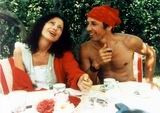
The story of lonely Delphine, who tries to spend her vacation out of Paris, contemplates the possible hidden sense of our everyday wanderings. At the Venice IFF in 1986 director Eric Rohmer took the Golden Lion and the FIPRESCI Prize for this gentle comedy.

It’s June and all of Paris is off on vacation. A secretary named Delphine has two weeks free time ahead of her, but at the last moment a girlfriend backs out of their planned trip because she wants to spend time with her new boyfriend. Delphine is currently single, however, and going to Ireland with her parents doesn’t sound like much fun. Her friends invite her to Cherbourg, but she returns home after a few days lonelier and more depressed than before. Not even the opportunity of going to the Alps with her ex-boyfriend turns out well. In the end, she decides to wash her hopelessness away in the sea. But Delphine, by now already rather withdrawn, feels terrible among the crowd of tanned sunbathers. She does meet a young Swede, but she had imagined her vacation as one fling after another. Delphine then gives up, packs up and heads back to Paris to finish up her vacation. At the train station in Biarritz, however, a kindly-looking young man strikes up a conversation with her and points out a unique natural phenomenon: a green ray created at sunset over the sea. This gentle comedy, written by the director and his lead actress Marie Riviére, contemplates the possible hidden sense of our everyday wanderings. The director took the Golden Lion and the FIPRESCI Prize at Venice.
98 min / Color, 35 mm
Director Eric Rohmer
/ Screenplay Eric Rohmer
/ Dir. of Photography Sophie Maintigneux
/ Music Jean-Louis Valéro
/ Editor María Luisa García
/ Producer Margaret Ménégoz
/ Production Les Films du Losange
/ Cast Marie Riviere, Amira Chemakhi, Rosette, Béatrice Romand, Vincent Gauthier, Carita
/ Contact Národní filmový archiv, Les Films du Losange

Eric Rohmer (b. 1920, Tulle, France) started out as a film critic. During the famous era of the French new wave he contributed to the renowned magazine Cahiers du Cinéma, where he later worked as editor-in-chief. In 1959 he wrote and directed his debut The Sign of Leo (Le signe de lion). In the sixties he began the first of his famous cycles – the six-part Moral Tales (Contes moraux), though he didn’t make a name for himself until the third part, The Collector (La collectionneuse, 1966). He became known outside France with the films My Night at Maud’s (Ma nuit chez Maud, 1969), Claire’s Knee (Le genou de Claire, 1970) and Chloe in the Afternoon (L’amour aprés-midi, 1972). In the eighties he began another loose cycle called Comedies and Proverbs (Comédies et proverbs) which includes The Green Ray (Le rayon vert, 1986) in addition to The Aviator’s Wife (La femme de l’ aviateur, 1980), Pauline at the Beach (Pauline á la plage, 1982) and Full Moon in Paris (Les nuits á la pleine lune, 1984). At the end of the eighties, this exceptionally original, oft-awarded filmmaker began a new cycle, Tales of the Four Seasons (Contes des quatre saisons).
Národní filmový archiv
Závišova 5, 140 00, Praha 4
Czech Republic
E-mail: [email protected]
Les Films du Losange
7/9 rue des Petites Écuries, 750 10, Paris
France
Phone: +33 144 438 710
E-mail: [email protected]

Milan Líčka
Film Institution Rep.
First-hand brews throughout the year.
Be among the first to learn about upcoming events and other news. We only send the newsletter when we have something to say.